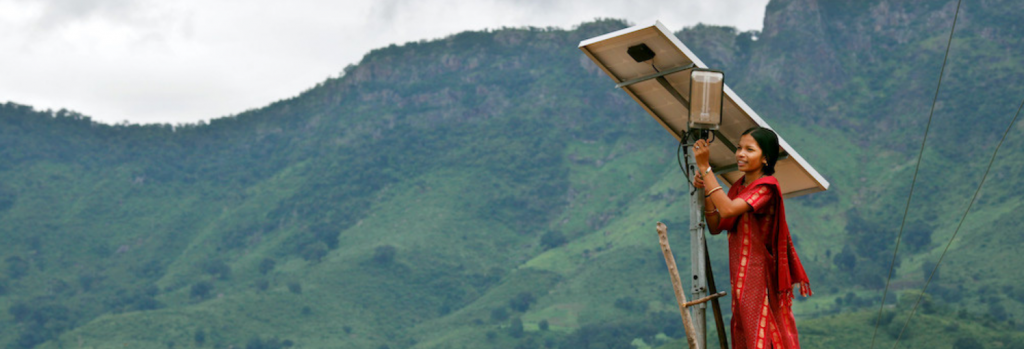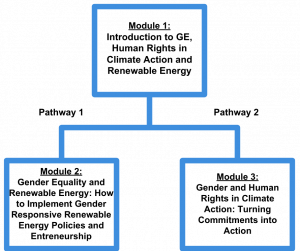
Introduction
Climate change effects are far-reaching and concern every aspect of society, from economic development to the realization of human rights. By multiplying existing threats, climate change disproportionally affects vulnerable groups – such as women, youth, the elderly, and persons with disabilities, reducing their ability to adapt and respond to its challenges, and enhancing inequalities.
In this context, it is crucial that decision-makers are equipped with the tools and knowledge to integrate gender and human rights in climate policies and commitments as well as develop inclusive climate mitigation and adaptation actions in sectors like renewable energy, while actors such as financiers and entrepreneurs engage in appropriate schemes and ventures on renewable energy conducive to those who experience inequalities including the women.
This training programme is designed to strengthen the capacity of decision-makers from the Asia-Pacific region on gender equality and human rights. It comprises two parts.
Part 1 – E-learning course
The programme starts with the completion of an e-learning course on Gender Equality and Human Rights in Climate Action and Renewable Energy, which unpacks these critical issues.
Learning Objectives
At the end of the course, participants will be able to:
- Describe the nexus between gender equality, human rights, renewable energy, and climate change
- Explain how a gender-responsive and human rights-based approach in climate action leads to economic, social, and environmental benefits
- Recognize international and sectoral commitments on gender equality, human rights, and climate change and their relationship with national priorities and policies
- Identify entry points for gender and human rights in renewable energy and climate policy and action
- Select and apply tools and approaches for the promotion of human rights-based and gender-responsive climate action
- Discuss targeted opportunities for women in climate change and renewable energy, with a particular focus on multi-stakeholder collaboration, renewable energy entrepreneurship, and access to finance.
The course can be accessed for free, it is self-paced and available on the UN CC:Learn e-learning platform at the following link here. To start learning, please register to the platform here.
The course provides participants with the option to choose between two learning paths based on their interests. Pathway 1 is particularly intended for renewable energy experts and professionals of financial institutions. Pathway 2 is designed specifically for climate change and green economy policymakers. Both pathways have a common introductory module, followed by a more specialized one. Each learning pathway takes around 4 hours to complete.

A certificate is awarded to those who successfully complete the course. For further information, please access the course syllabus.
Completion of the course, i.e. the pathway that is most relevant to you, is a pre-requisite to access the second part of the training programme. Please share the e-course certificate with Julia Villalba ([email protected]) before the workshop to confirm your eligibility.
Part 2 – Moderated Session
A 2 half-a-day moderated e-workshop will promote discussion, application of the knowledge acquired through the e-learning course and experience-sharing among national policymakers, government officials, representatives from financial institutions from different countries in the Asia-Pacific region, particularly Bangladesh, Viet Nam, Cambodia, Sri Lanka and Indonesia.
Learning Objectives
After completing the e-workshop, participants will be able to:
- Identify gender equality and human rights dimensions relevant to climate action and policy
- Discuss and outline gender equality and human rights actions within a specific sector
- Identify and present good practices and key challenges to integrating gender and human rights into climate change from the Asia-Pacific region
Date, Location and Language
This moderated workshop will take place online through the video conference platform Zoom on Wednesday, 6th April and Thursday, 7th April 2022. Please, check the time zone below:
- 1:00 – 5:00 pm ICT (Bangkok/Hanoi/Jakarta/Phnom Penh Time)
- 12:00 – 4:00 pm (Dhaka time)
- 11:30 am – 3:30 pm (Colombo time)
The event will be held in English and interpretation in Khmer and Vietnamese will be available.
In order to guarantee a fully interactive experience of the workshop, we highly recommend that participants sign-in on Zoom prior to the event. Registration on this platform is free of charge.
The connection details and agenda will be shared by email with participants. Kindly check your spam box.
Registration
To register and save your spot, please fill in the registration form sent by e-mail. Only invited applicants are eligible to join the e-workshop. The registration will be closed on Monday, 4th April.
Materials
Click here to access the Logistical Note
Click here to check the Participant’s Manual
Pre-Assessment
We invite participants to fill in the pre-assessment which will help us and our experts design the e-workshop according to your needs as we want to ensure you leave at the end with the most value possible and get the answers you’re looking for. This assessment is now closed.
Certification
This e-workshop includes two possible levels of certification:
Level 1: All participants who actively participate in the e-workshop, attending both days, will receive a UN Certificate of Participation.
Level 2: Participants who test their knowledge and pass the final assessment, comprising of 2 sets of questions, distributed at the end of Day 1 and Day 2, will receive a UN Certificate of Completion. Successful completion will require a score of 70% or higher in the final assessment.
The certificates will be sent via email to successful participants.
Networking Group
All training participants are invited to join the dedicated LinkedIn Group.
About the Organizers
This training programme is jointly developed by UN CC:Learn, UN Environment and UN Women under the project EmPower: Women for Climate Resilient Societies, with the support of the Swedish International Development Cooperation Agency.

